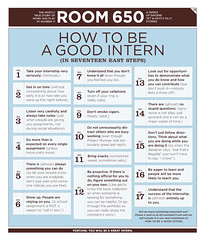I remain optimistic on this notion, but caution the small business recruiter that employing students is more art than science. If the selection and “hiring” processes are not handled properly, lots of time could be wasted and you could develop a quick distaste for students everywhere.
Avenues to pursue.
Official intern programs.
Most colleges have an intern program, where students learn, contribute to your company and earn credit. Most of these programs are structured and require that the student have 3-5 different projects to complete in a set time frame. Excessive filing and taking out the trash are not acceptable projects. The projects need to be defined as win/win for the student and the company. Most universities have an intern liaison department and an online posting system. This is who you need to reach out to.
Job posting boards.
This type of internship will be more flexible in terms of not being tied to any curriculum structure. These job boards are usually free and expose you to students just looking for extra money. If you are lucky you’ll connect with students studying something that has to do with your business. Contact the career out placement department.
Class projects.
This type of intern effort or student help is launched by a professor and can involve the entire class working on one project, or the class may be divided into several groups. If you score a smart class you can get some great ideas for no money. Which is good. And, the students gain exposure to real world business problem solving.
Pay or not to pay?
I have tried both. And as of writing this blog post, I have yet to recruit a meaningful intern without paying them something ($7-10 bucks an hour). Your range of cost will vary by economic conditions and the size of market you are in.
My overall experiences have been mixed. When you find a great one, you get a lot more than you pay for, I suppose that balances out the lame ones you waste time on. We have had our share of super lame ones. Looking back, I think we were guilty of not recruiting or outlining tasks well.
Here are 6 tips that can help be apart of a win/win intern program.
1) Make sure your job post is well written and clearly defines your expectations.
Include info on your company culture and describe the ideal personality and interest area you seek. Skill sets are usually to virgin to throw into the mix. Key attributes for us has been problem solving and creativity. I found some great examples in www.docstoc.com.
2) Use filters in your interview process.
Once you start getting resumes, filter out the slackers by replying with a clear question or mini project that requires thinking, writing and problem solving. Then start with a phone interview. Ask questions that will test their research and preparation initiatives. This will give you a lot of insight into their verbal communication skills. If they have not done a google search on you and your company, NEXT. If they pass both of those with flying colors, then schedule a face-to-face interview.
3) Do not expect CEOs from this bunch. They are student interns.
However, the more disciplined you are in planning and documenting their assignments, the better work product you will get. Require time-tracking and written communications.
4) Recognize their achievements in private and in public.
One of the most important things a supervisor can do with an intern is to help build their confidence. Many students will operate in a low self-esteem mode and will be scared to try things they could mess up.
5) Don’t assume they know everything.
There are a lot of things entrepreneurs and managers have learned though life experiences. For the most part these students don’t have those experiences. Don’t assume they do. Could be a disaster headed your way.
6) Patience is not a virtue. It’s a necessity.
It you don’t have the luxury of time, an intern may not be the most effective way to get good, low-cost help. If you do have the time and patience, you can find a gold gem, like the one Oddpodz has right now from the University Of South Florida. Keep up the good work, Shaina!

In closing, I stumbled upon this great doc that describes “How to be a good intern.” Click here to read. It’s a valuable perceptive for intern prospects and recruiters. It was produced by number17, a multi-disciplinary design studio working in print, television and online, and lead by Emily Oberman and Bonnie Siegler.





